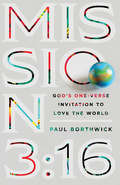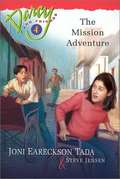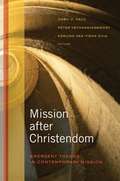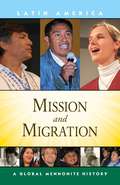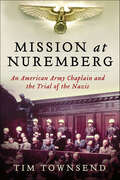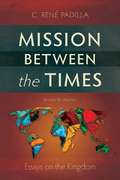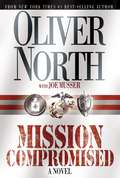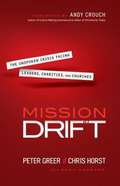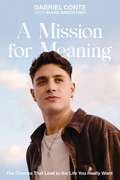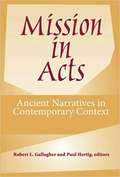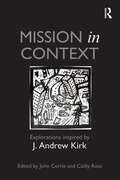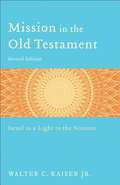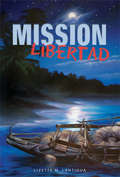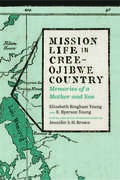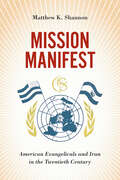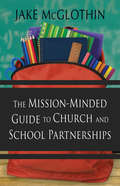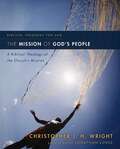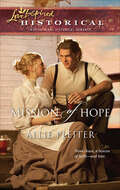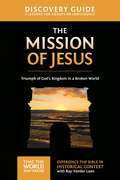- Table View
- List View
Mission: Out of Control
by Susan May WarrenBrody "Wick" Wickham is a former Green Beret turned security agent-with a 100 percent mission success rate. No way is his new assignment changing that. Even if it's protecting a diva American rock star while she's on tour in Europe. Except Veronica "Vonya" Wagner isn't just a beautiful celebrity used to having her way-she's the daughter of a U. S. Senator. And she's hiding a dangerous secret. When Wick discovers what's at stake, how far over the line will he go to keep them both alive?
Mission 3: God's One-Verse Invitation to Love the World
by Paul Borthwick"For God so loved the world that he gave his one and only Son, that whoever believes in him shall not perish but have eternal life." —John 3:16
The Mission Adventure (Darcy and Friends)
by Steve Jensen Joni Eareckson TadaAlthough beeing in a wheelchair will make the trip difficult, Darcy feels called to go with members of her church on a mission to Guatemala where she and her sister help a deaf orphan. <P><P><i>Advisory: Bookshare has learned that this book offers only partial accessibility. We have kept it in the collection because it is useful for some of our members. Benetech is actively working on projects to improve accessibility issues such as these.</i>
Mission after Christendom: Emergent Themes in Contemporary Mission
by Obgu U. Kalu; Peter Vethanayagamony; Edmund Kee-Fook ChiaIn 1910 Protestant missionaries from around the world gathered to explore the role of Christian missions in the twentieth century. In this collection, leading missiologists use the one hundred year anniversary of the Edinburgh conference as an occasion to reflect on the practice of Christian mission in today's context: a context marked by globalization, migration, ecological crisis, and religiously motivated violence. The contributors explore the meaning of Christian mission, the contemporary context for mission work, and new forms in which the church has engaged-and should engage-in its missionary task. From these essays, a vision of twenty-first-century mission begins to emerge-one that is aware of issues of race, gender, border spaces, migration, and ecology. This renewed vision gives strength to the future of shared Christian ministry across nations and traditions.
Mission and Migration: A Global Mennonite History (Global Mennonite History: Asia Ser.)
by John LappMission and Migration is the first comprehensive history to be written by Latin American Mennonite historians about Mennonite church life in Central and South Americas from its beginnings. From the Introduction to the volume: "The story of the coming of Anabaptist-descended churches to Latin America begins, not in the Spanish colonial period, but in the late nineteenth and early twentieth centuries, in the period following Latin American political independence from Spain and Portugal. " The first Mennonite church to take root in Latin American soil gathered for worship in 1919, in the town of Pehuajo, Argentina. It was the result of North American mission efforts and represents one major impulse for the planting of Mennonite churches in Latin America. "The second major impulse came with the settling of Mennonite colonists in Mexico, Paraguay, and Brazil, in the 1920s and '30s. The Mennonite colonists did not come to Latin America as missionaries, but rather to settle as ethnic and religious communities, seeking new life and a future. "Given the variety of Mennonites who live in Latin America, the question, 'Who or what is a Latin American Mennonite Christian?' is a recurring theme that runs throughout our story, including the present day."
Mission at Nuremberg: An American Army Chaplain and the Trial of the Nazis
by Tim Townsend“Just when you think there could be nothing new to say about the Nazis, here’s a unique account that raises pressing moral and spiritual issues.” —Library JournalLutheran minister Henry Gerecke was fifty years old when he enlisted as an Army chaplain during World War II. As two of his three sons faced danger and death on the battlefield, Gerecke tended to the battered bodies and souls of wounded and dying GIs outside London. At the war’s end, when other soldiers were coming home, Gerecke was recruited for the most difficult engagement of his life: ministering to the twenty-one Nazis leaders awaiting trial at Nuremburg.Based on scrupulous research and first-hand accounts, including interviews with still-living participants and featuring sixteen pages of black-and-white photos, Mission at Nuremberg takes us inside the Nuremburg Palace of Justice, into the cells of the accused and the courtroom where they faced their crimes. As the drama leading to the court’s final judgments unfolds, Tim Townsend brings to life the developing relationship between Gerecke and Hermann Goering, Albert Speer, Wilhelm Keitel, Joachim von Ribbentrop, and other imprisoned Nazis as they awaited trial.Powerful and harrowing, Mission at Nuremberg offers a fresh look at one most horrifying times in human history, probing difficult spiritual and ethical issues that continue to hold meaning, forcing us to confront the ultimate moral question: Are some men so evil they are beyond redemption?“A gripping story . . . puts the reader inside the cells of various Hitler henchmen.” —The Wichita Eagle“Townsend authoritatively addresses the excruciating moral and religious issues confronting wartime chaplains . . . rich, potentially explosive.” —Kirkus Reviews
Mission Between the Times
by C. Rene PadillaRene Padilla is one of the premier representatives of orthodox evangelicalism in Latin America. He has consistently championed integral mission, a holistic understanding of Christian mission in which there is no artificial barrier between evangelisation and social responsibility. Biblical, faithful to Scripture, contemporary and inspirational, the core message of this updated classic remains just as urgent as when it was first published twenty-five years ago (Eerdmans, 1985). This revised version includes a new essay on the contemporary history of integral mission, a history that began with the Latin American Theological Fellowship, progressed within the Lausanne Movement, is bearing fruit globally through the Micah Network, and challenges evangelicals to address the major issues of our day
Mission Compromised: A Novel
by Oliver L. North Joe MusserMajor Peter Newman, U.S. Marines, was a highly decorated hero, content doing his job-leading his troops into harm's way. He was good at it. But the White House had other plans for him. When Newman is handpicked for a dangerous clandestine operation as the head of the White House Special Projects Office, his orders are clear-hunt down and eliminate terrorists before they attack the United States with weapons of mass destruction. From the corridors of power in Washington to the heart of the Middle East, Newman finds himself on an assignment so sensitive that it's known only to a handful of officials as he becomes entangled in a nightmarish web of intrigue, revenge, and betrayal. When the mission is compromised, Newman embarks on a personal odyssey that threatens his life, morality, marriage', and his loyalty to Corps and country.
Mission Drift: The Unspoken Crisis Facing Leaders, Charities, and Churches
by Peter Greer Chris HorstWithout careful attention, faith-based organizations drift from their founding mission. It's that simple. It will happen. <p><p> Why do so many organizations wander from their mission, while others remain Mission True? Can drift be prevented? In Mission Drift, HOPE International executives Peter Greer and Chris Horst show how to determine whether your organization is in danger of drift, and they share the results of their research into Mission True and Mission Untrue organizations. Even if your organization is on course, it's wise to look for ways to inoculate yourself against drift. You'll discover what you can do to prevent drift or get back on track and how to protect what matters most.
A Mission for Meaning: The Choices That Lead to the Life You Really Want
by Gabriel ConteFor anyone who feels like they'll never live the life they dream of living, let social media sensation and entrepreneur Gabriel Conte be an inspiration to you: The life you want can be yours. And you can begin to earn it, achieve it, and live it right now.Gabriel Conte has created a life that others dream of--he's married to the love of his life, he's an entrepreneur in multiple fields, he nurtures great relationships with his parents and siblings, and he's sustaining a vibrant relationship with God that's at the heart of everything he does. But it didn't happen overnight. He's worked with intention to get to where he is today.With encouraging and uplifting stories from his personal journey--including the highs, lows, ups, downs, missteps, big decisions, small decisions, breakthroughs, and miracles--A Mission for Meaning highlights what he's learned about life, love, and being accountable for the consequences of your decisions.As Gabriel recounts the behind-the-scenes secrets of the intentional choices that led him to achieve his success at such a young age, he aims to help you on your own path to a better life by giving you the tools you need to:Make small intentional decisions that will lead to the life you wantSurround yourself with the right people to benefit every area of your lifeCultivate a relationship with a loving God that can change your life for the betterFind creative outlets and career choices that will bring you joyStay true to yourself to achieve the success you're looking for Success--however you choose to define it--can be yours, starting today. Let A Mission for Meaning be your guide along the way.Praise for A Mission for Meaning:"There is power in authenticity and vulnerability, and Gabe gifts that to his readers in spades. In sharing his struggles, from walking the valleys of depression to embarking on the journey to embrace failure as opportunity, he doesn't hold back. While Gabe's story is truly one of a kind, the themes are universal and relevant to today's generation in a big way."--Matt James, star of The Bachelor season 25
Mission In Acts: Ancient Narratives In Contemporary Context (American Society Of Missiology Ser. #34)
by Robert L. Gallagher Paul HertigA commentary on the Acts of the Apostles that applies the biblical text to the challenges of mission and ministry in today's multicultural context.
Mission in Christ's Way: An Orthodox Understanding of Mission
by AnastasiosA collection of fifteen significant essays on Orthodox Christian Mission prepared by the author over his ministry. They demonstrate that mission is the work of the entire Christian Church, not just a specialized interest of a few experts. <p><p>The papers have been edited to avoid repetitions, but they show the development of Orthodox Christian thinking on missions and evangelism. Prepared for various occasions over the years, from ecumenical conferences to Orthodox publications, each essay is introduced by its extensive publication history.
Mission in Context: Explorations Inspired by J. Andrew Kirk
by Cathy Ross John CorrieStimulated by Andrew Kirk's mission theology, this book brings fresh theological reflection to a wide range of mission issues. A formidable group of international missiologists are drawn together to explore current reflections on a wide range of issues including: poverty and injustice, environmentalism, secularism, the place of scripture in a pluralist culture, science and faith, liberation theology, oppression and reconciliation, and much more. Kirk's influence and reputation is international, and extends to South America, USA, Eastern Europe, Africa and SE Asia. Latin American mission has been especially enriched by Kirk's innovative thinking on revolutionary politics, contextualisation and holistic mission. This is an indispensable resource of up-to-date missiological reflections for all involved in mission at every level.
Mission In The Old Testament: Israel As A Light To The Nations
by Walter C. Jr. KaiserWalter Kaiser questions the notion that the New Testament represents a deviation from God's supposed intention to save only the Israelites. He argues that--contrary to popular opinion--the older Testament does not reinforce an exclusive redemptive plan. Instead, it emphasizes a common human condition and God's original and continuing concern for all humanity. Kaiser shows that the Israelites' mission was always to actively spread to gentiles the Good News of the promised Messiah. This new edition adds two new chapters, freshens material throughout, expands the bibliography, and includes study questions.
Mission in the New Testament: An Evangelical Approach
by William J. Larkin Joel F. WilliamsThis book presents a comprehensive articulation of New Testament teachings on mission from a contemporary American evangelical standpoint. Mission in the New Testament contributes a fresh statement of the biblical foundations of mission, serving as a catalyst for completion of the church's universal mission in this generation. After investigating the historical background of the idea of mission in the Hebrew Scriptures, inter-testamental Judaism, the life of Jesus and the beginnings of the church, the book proceeds in a roughly canonical order through the New Testament. Essays analyze the works of Paul, the Synoptic gospels, Acts of the Apostles, the General Epistles, and the Book of Revelation. Well-versed in the historical-critical method of biblical interpretation, editors and contributors alike offer a cogent argument for recovering the "missional horizon" of the New Testament.
Mission in the Third Millennium
by Robert J. SchreiterFreedom of the sort implicated in acting freely or with free will is important to the truth of different sorts of moral judgment, such as judgments of moral responsibility and those of moral obligation. Little thought, however, has been invested into whether appraisals of good or evil presuppose free will. This important topic has not commanded the attention it deserves owing to what is perhaps a prevalent assumption that freedom leaves judgments concerning good and evil largely unaffected. The central aim of this book is to dispute this assumption by arguing for the relevance of free will to the truth of two sorts of such judgment: welfare-ranking judgments or judgments of personal well-being (when is one's life intrinsically good for the one who lives it?), and world-ranking judgments (when is a possible world intrinsically better than another?). The book also examines free will's impact on the truth of such judgments for central issues in moral obligation and in the free will debate. This book should be of interest to those working on intrinsic value, personal well-being, moral obligation, and free will.
Mission In the Twenty-First Century: Exploring the Five Marks of Global Mission
by Andrew F. Walls Cathy RossThe book introduces Mission as the willingness to hear good news, as the Word goes abroad and gets embedded in culture after culture, in the new global landscape.
Mission Libertad
by Lizette M. LantiguaLife isn t easy in 1970s Communist Cuba. But Luis Jemot and his family are willing to risk their lives to find freedom. Despite landing into a great new life in the United States, Luis can t help fearing for the safety of his grandmother, left behind in Havana. Tasked with a mysterious, but urgent mission, he wonders What has she become involved in? He will have to discover courage in unlikely places and draw on his newfound faith to fulfill his promise to her.
Mission Life in Cree-Ojibwe Country: Memories of a Mother and Son
by Elizabeth Bingham Young E. Ryerson Young Jennifer S. BrownIn May of 1868, Elizabeth Bingham Young and her new husband, Egerton Ryerson Young, began a long journey from Hamilton, Ontario, to the Methodist mission of Rossville. For the next eight years, Elizabeth supported her husband’s work at two mission houses, Norway House and then Berens River. Unprepared for the difficult conditions and the “eight months long” winter, and unimpressed with “eating fish twenty-one times a week,” the young Upper Canada wife rose to the challenge. In these remote outposts, she gave birth to three children, acted as a nurse and doctor, and applied both perseverance and determination to learning Cree, while also coping with poverty and short supplies within her community. Her account of mission life, as seen through the eyes of a woman, is the first of its kind to be archived and now to appear in print. Accompanying Elizabeth’s memoir, and offering a counterpoint to it, are the reminiscences of her eldest son, “Eddie.” Born at Norway House in 1869 and nursed by a Cree woman from infancy, Eddie was immersed in local Cree and Ojibwe life, culture, and language, in many ways exemplifying the process of reverse acculturation often in evidence among the children of missionaries. Like those of his mother, Eddie’s memories capture the sensory and emotional texture of mission life, providing a portrait that is startling in its immediacy. Skillfully woven together and meticulously annotated by Jennifer Brown, these two remarkable recollections of mission life are an invaluable addition to the fields of religious, missionary, and Aboriginal history. In their power to resurrect experience, they are also a fascination to read.
Mission Manifest: American Evangelicals and Iran in the Twentieth Century (The United States in the World)
by Matthew K. ShannonIn Mission Manifest, Matthew Shannon argues that American evangelicals were central to American-Iranian relations during the decades leading up to the 1979 revolution. These Presbyterian missionaries and other Americans with ideals worked with US government officials, nongovernmental organizations, and their Iranian counterparts as cultural and political brokers—the living sinews of a binational relationship during the Second World War and early Cold War. As US global hegemony peaked between the 1940s and the 1960s, the religious authority of the Presbyterian Mission merged with the material power of the American state to infuse US foreign relations with the messianic ideals of Christian evangelicalism. In Tehran, the missions of American evangelicals became manifest in the realms of religion, development programs, international education, and cultural associations. Americans who lived in Iran also returned to the United States to inform the growth of the national security state, higher education, and evangelical culture. The literal and figurative missions of American evangelicals in late Pahlavi Iran had consequences for the binational relationship, the global evangelical movement, and individual Americans and Iranians. Mission Manifest offers a history of living, breathing people who shared personal, professional, and political aims in Iran at the height of American global power.
The Mission-Minded Guide to Church and School Partnerships
by Jake McglothinPartnering your church family with a public school can be a rewarding experience, but also presents some unique challenges. The Mission-Minded Guide to Church and School Partnerships offers practical steps that congregations can take to make a difference with the children in their community. From basic organization, training, safety, and planning helps leaders will learn how to share the vision and effectively recruit and train volunteers. Most importantly, leaders will discover practical steps they can take to begin a two way, trusting relationship with a school, principal and teachers. In addition, there are suggestions for sharing information through newsletters, presentations, and special Sundays for welcoming the schools, teachers, and principals, and more. Inspire your church family to embrace the power they have to change lives and make a difference in their community.
The Mission of God: Unlocking the Bible's Grand Narrative
by Christopher J. WrightChristianity Today
The Mission of God's People: A Biblical Theology of the Church’s Mission (Biblical Theology for Life)
by Christopher J. Wright"In The Mission of God’s People, Chris Wright shows how God’s big-picture plan directs the purpose of God’s people, the church. Wright’s pioneering 2006 book, The Mission of God, revealed that the typical Christian understanding of “missions” encompasses only a small part of God’s overarching mission for the world. God is relentlessly reclaiming the entire world for himself. Wright emphasizes what the Old Testament teaches Christians about being the people of God. He addresses questions of both ecclesiology and missiology with topics like “called to care for creation,” “called to bless the nations,” “sending and being sent,” and “rejecting false gods.” As part of the Biblical Theology for Life Series, this book provides you—whether you’re a pastor, teacher, or lay learner—with first-rate biblical study while at the same time addressing the practical concerns of contemporary ministry. The Mission of God’s People promises to enliven and refocus the study, teaching, and ministry of those truly committed to joining God’s work in the world."
Mission of Hope
by Allie PleiterFrom chaos comes a beacon of faith—and love—in this inspirational historical romance from the author of The Doctor’s Undoing.No one knows who he is or where he’s from. But witnesses throughout San Francisco report a masked man in black is bringing supplies—and badly needed hope—to homeless earthquake survivors.Some believe that the city’s gallant rescuer is a gentleman of wealth. But others whisper that he is a working-class man with courage as great as his faith. And rumor has it that one of the city’s most spirited society belles is helping him against her family’s wishes.What can be confirmed is that the masked messenger will need more than a miracle to escape those on his trail—and win the woman risking everything to save him . . .
The Mission of Jesus Discovery Guide: Triumph of God’s Kingdom in a World in Chaos (That the World May Know)
by Ray Vander Laan Stephen And SorensonIn John 17:26 Jesus says "I made known your name to them, and I will continue to make it known..." In this fourteenth volume of That the World May Know, you'll deepen your understanding of this passionate revelation to a broken world God longs to redeem. Discover how Jesus triumphantly made God's presence known on Earth, and how he asks you to do the same—bringing God's shalom to the chaos of others. Sessions include: Capernaum: Jesus Blinds the Evil One Decapolis: The Other Side—Jesus and the Man Crucifixion: The Coronation of a King Ascension: The King Takes His Throne Pentecost: God Changed His Address Designed for use with The Mission of Jesus Video Study 9780310812586 (sold separately).

